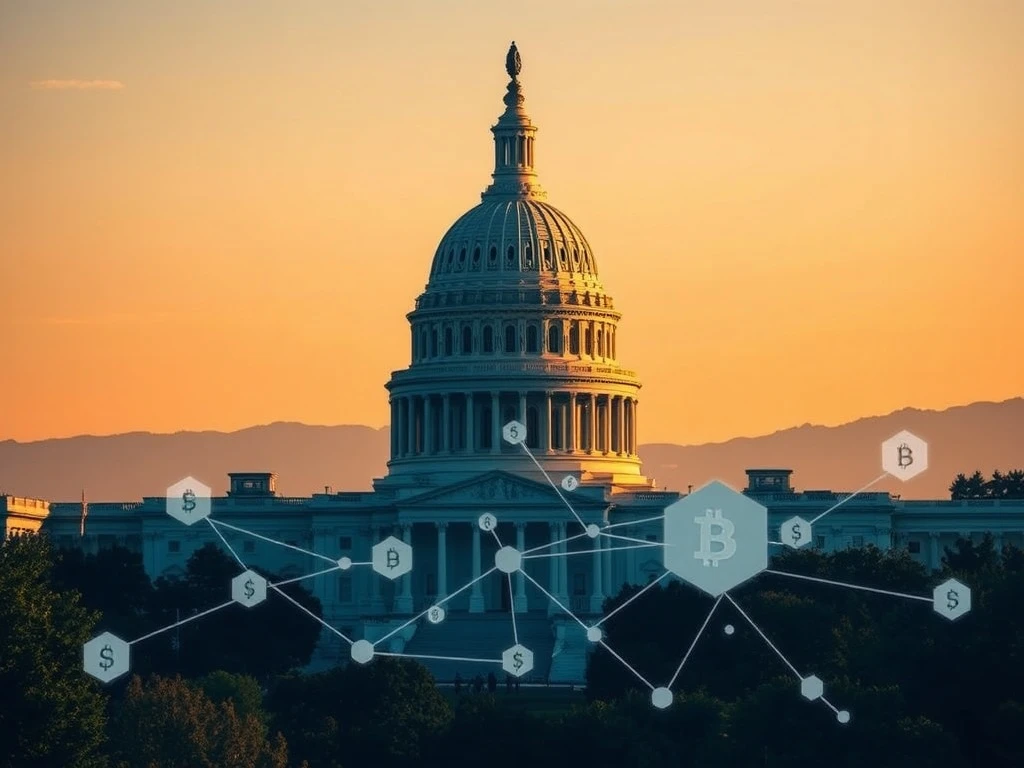Crypto Tax Relief Plan Sparks DeFi Momentum: US Senator Lummis Bill Fuels Growth

Exciting developments are unfolding in the US crypto landscape! A significant move by US Senator Cynthia Lummis is set to provide much-needed crypto tax relief, potentially sparking renewed DeFi momentum and accelerating the integration of traditional finance with decentralized solutions. This comes alongside other key trends like the tokenization of Real-World Assets and ongoing global Crypto Regulation efforts.
US Senator Lummis Proposes Key Crypto Tax Exemptions
US Senator Lummis recently introduced a draft bill aimed at modernizing the US tax code for digital assets. The core proposals are designed to make participating in the digital economy simpler and less prone to accidental tax violations. Here are the highlights:
- **De Minimis Exemption:** Exempts small digital asset transactions and capital gains of $300 or less annually, with a total annual exemption cap of $5,000.
- **Deferred Taxation on Mining and Staking:** Taxes on rewards from mining and staking would be deferred until the underlying tokens are sold, rather than being taxed upon receipt.
- **Exemptions for Lending and Charitable Contributions:** Crypto lending agreements and digital assets used for charitable donations would also see tax relief provisions.
Senator Lummis emphasized that this legislation aims to cut bureaucratic red tape and establish common-sense rules reflecting how digital technologies work. This initiative is seen as a crucial step following the passage of the GENIUS Act, which provides clarity on stablecoins and is expected to encourage institutional adoption.
Regulatory Clarity Fuels DeFi Momentum
The increasing regulatory clarity in the US, partly driven by efforts like the GENIUS Act and Senator Lummis’s tax bill, is enabling more traditional finance participants to explore decentralized financial solutions. Stani Kulechov, founder of Aave Labs, suggested that negative experiences with traditional banking are pushing finance towards fintech and decentralized applications.
This shift highlights a growing interest in DeFi’s potential to offer alternatives to traditional financial services. The potential for DeFi momentum is significant as regulatory frameworks become clearer, reducing uncertainty for larger players.
The Rise of Real-World Assets Tokenization
Beyond core DeFi, the tokenization of Real-World Assets (RWAs) is emerging as a major opportunity for the crypto sector to engage with traditional finance. Industry leaders view RWA tokenization as a multi-trillion-dollar market.
Recent developments underscore this trend:
- **Ondo Catalyst Fund:** Ondo Finance and Pantera Capital plan to invest $250 million in RWAs through a new fund, highlighting the growing focus on tokenization amid favorable US regulatory conditions.
- **Exchange Focus:** Exchanges like Robinhood and Kraken are launching or planning to offer tokenized US stocks and ETFs to international investors. Coinbase is also reportedly seeking approval for similar offerings.
- **Chainlink ACE:** Chainlink launched a new compliance framework, ACE, designed to unlock institutional capital for the tokenized asset economy by providing compliance and identity standards.
This activity signals an ‘arms race’ in the tokenization market, driven by the potential to bring vast amounts of traditional capital onchain.
Global Crypto Regulation and Security Landscape
While the US makes strides in tax and stablecoin clarity, global Crypto Regulation continues to evolve, largely influenced by the Financial Action Task Force (FATF). The FATF’s Travel Rule, requiring service providers to share transaction data, is seeing increasing adoption globally.
The FATF’s latest report highlighted stablecoins and DeFi for their rising use in illicit finance and plans to release targeted papers on these areas, indicating potential future regulatory focus.
On the security front, crypto losses due to hacks and exploits reached $2.47 billion in the first half of 2025. However, the second quarter saw a decrease in the number of hacking incidents, suggesting a potential improvement in security practices despite a few large-scale events skewing the total loss value.
Market Overview and Key Performers
Amidst these regulatory and developmental trends, the broader crypto market saw positive movement. Most of the top 100 cryptocurrencies ended the week in the green. Notably, the Pudgy Penguins (PENGU) token and Bonk (BONK) memecoin saw significant gains.
Decentralized exchanges also showed strength. PancakeSwap, a major multichain DEX, reported a record $325 billion in trading volume for June, pushing its second-quarter volume to $530 billion, more than double the previous quarter. This growth is attributed to recent upgrades like PancakeSwap Infinity, which improved user experience, trading efficiency, and liquidity provider options.
Conclusion: Navigating a Dynamic Crypto Future
The crypto space is experiencing rapid evolution, driven by regulatory progress, technological innovation, and increasing institutional interest. Initiatives like US Senator Lummis‘s crypto tax relief plan provide crucial clarity, potentially boosting DeFi momentum and paving the way for the widespread adoption of Real-World Assets tokenization. While Crypto Regulation remains a global focus, and security challenges persist, the underlying infrastructure and market activity point towards continued growth and integration between traditional and decentralized finance.









